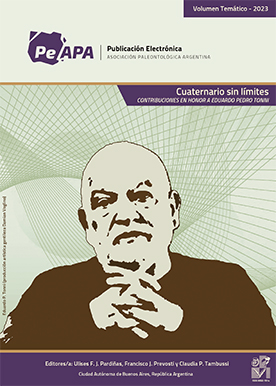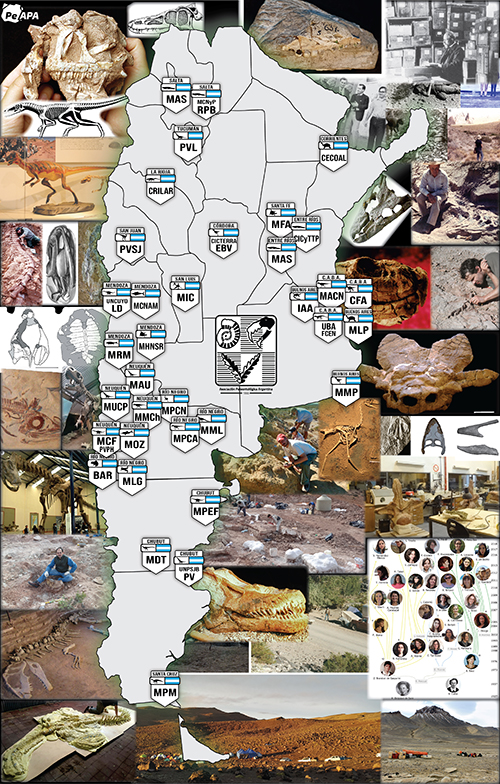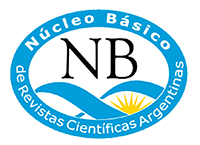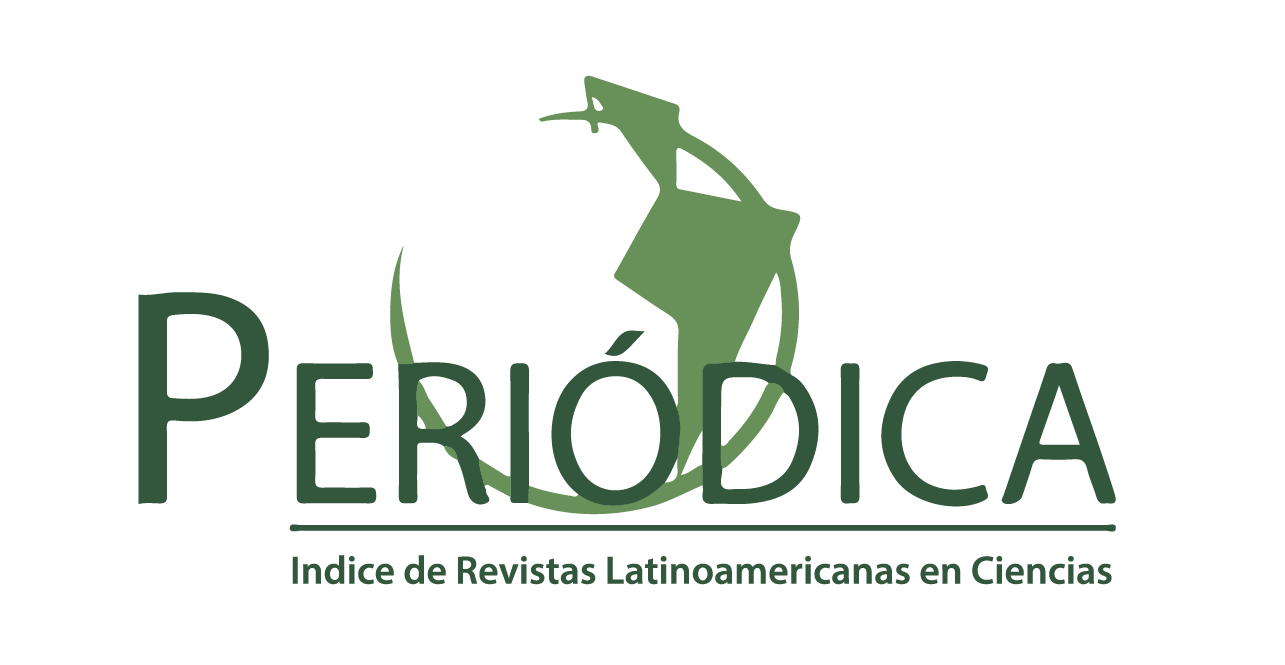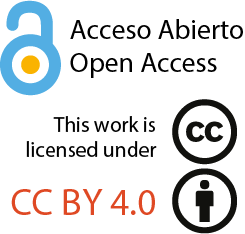RECONSTRUCCIÓN PALEOAMBIENTAL DEL HOLOCENO MEDIO-TARDÍO EN UN SECTOR DEL RÍO SALADO - BAHÍA SAMBOROMBÓN UTILIZANDO FORAMINÍFEROS BENTÓNICOS
DOI:
https://doi.org/10.5710/PEAPA.08.04.2024.492Palabras clave:
Transgresión marina, Máximo nivel del mar, Ambientes marino-marginalesResumen
Las variaciones del nivel del mar durante el Holoceno y su efecto sobre los ambientes costeros se han preservado con muy buena calidad en diferentes lugares del mundo. Diversos trabajos realizados en el margen costero argentino han permitido entender el alcance y la magnitud de las ingresiones marinas ocurridas durante el máximo transgresivo del Holoceno Medio y su efecto sobre los ecosistemas. En esta investigación presentamos el análisis de la fauna de foraminíferos bentónicos en un afloramiento localizado en la Bahía Samborombón, Argentina, con el objetivo de definir el alcance máximo de la transgresión marina holocena en la zona media de la Bahía. A lo largo de toda la sección Cribroelphidium poeyanum, Cribroelphidium gunteri, Ammonia tepida, Elphidium galvestonense y Ammonia parkinsoniana fueron las especies más representativas, mientras que Quinqueloculina milletti y Haynesina germanica estuvieron representadas en menor proporción en algunos niveles. Este ensamble indica que el área de estudio representó un ambiente marino marginal salobre entre 6,261–5,919 cal. años AP y 1,725–1,511 cal. años AP. Sin embargo, la variación en la diversidad y abundancia de la fauna de foraminíferos evidencian el cambio de un ambiente estuarino somero (6,261–5,919 cal. años AP) a un ambiente de marisma salobre con depresiones inundables y mayor influencia de agua dulce (1,725–1,511 cal. años AP). Estos cambios están relacionados no solo con los eventos regresivos y transgresivos ocurridos durante el Holoceno, sino también con las características climáticas, oceanográficas, hidrológicas y geomorfológicas de la zona media de la Bahía Samborombón.
Referencias
Aguirre, M.L. & Whatley, R.C. (1995). Late Quaternary marginal marine deposits and palaeoenvironments from northeastern Buenos Aires Province, Argentina: A review. Quaternary Science Reviews, 14, 223–254. https://doi.org/10.1016/0277-3791(95)00009-E
Alve, E. (1999). Colonization of new habitats by benthic foraminifera: A review. Earth Science Reviews, 46(1–4), 167–185. https://doi.org/10.1016/S0012-8252(99)00016-1
Armynot du Châtelet, É., Bout-Roumazeilles, V., Riboulleau, A. & Trentesaux, A. (2009). Sediment (grain size and clay mineralogy) and organic matter quality control on living benthic foraminifera. Revue de Micropaleontologie, 52, 75–84. https://doi:10.1016/j.revmic.2008.10.002
Ballesteros-Prada, A. (2022). Estudio de los foraminíferos del holoceno en bahía Samborombón, provincia de buenos aires: implicancias paleoecológicas, paleoambientales y paleoclimáticas. [Doctoral Thesis, Universidad Nacional del Comahue Centro Regional Universitario Bariloche]. Recovered from: http://rdi.uncoma.edu.ar/handle/uncomaid/17091
Ballesteros-Prada, A., Luengo, M., Vilanova, I., Fucks, E. & Bernasconi, E. (2021). Foraminiferal paleodiversity and paleoenvironments at the NE coastal plain of Buenos Aires province (Argentina) during the Mid-Holocene sea level highstand. Holocene. 31, 108–120. https://doi:10.1177/0959683620961511
Ballesteros-Prada A. & Bernasconi, E. (2019). Study of marsh foraminifera from the coastal plain of Buenos Aires (Argentina) and its ecological implications. Zootaxa. 4560, 522–540. https://doi.org/10.11646/zootaxa.4560.3.5
Bernasconi, E. & Cusminsky, G. (2007). Foraminíferos bentónicos de un testigo del Holoceno de la cuenca del Colorado, Argentina. Ameghiniana. 44, 271–278.
Bernasconi, E. & Cusminsky, G. (2020). Calcareous microorganisms as indicators of oceanographic conditions in South West Atlantic Ocean. Journal of Marine Systems. 208, 2-14. https://doi.org/10.1016/j.jmarsys.2020.103369
Bernasconi, E., Mansilla, M. & Cusminsky, G. (2018). Recent benthic foraminifers from the South Atlantic shelf of Argentina. Journal of Foraminiferal Research. 48, 210–222. https://doi.org/10.2113/gsjfr.48.3.210
Bertels-Psotka, A. &Laprida, C. (1998a). Ostracoda (Arhropoda, Crustaceae) holocenos del miembro Canal 18, Formacion Las Escobas (Holoceno), Provincia de Buenos Aires, República Argentina. Revista Española de Micropaleontología. 1, 129–139.
Bertels-Psotka, A. &Laprida, C. (1998b). Ostracodos (Arhropoda, Crustaceae) del miembro Cerro de la Gloria, Formacion Las Escobas (Holoceno), Provincia de Buenos Aires, República Argentina. Revista Española de Micropaleontología. 1, 103–129.
Bertels-Psotka, A. &Laprida, C. (1998c). Ostracodos y paleoambientes Holocenos del nordeste de la provincia de Bueons Aires, Argentina. Ameghiniana. 35, 151–162.
Berkeley, A., Perry, C. T., Smithers, S. G., Horton, B. P., & Taylor, K. G. (2007). A review of the ecological and taphonomic controls on foraminiferal assemblage development in intertidal environments. Earth-Science Reviews, 83(3–4), 205–230. https://doi.org/10.1016/j.earscirev.2007.04.003
Boltovskoy, E., & Boltovskoy, A. (1968). Foraminíferos y tecamebas de la parte inferior del río Quequen Grande - Provincia de Buenos Aires, Argentina (sistemática, distribución, ecología). Revista del museo argentino de ciencias naturales. II – 127- 164
Boltovskoy, E., Giussani, G., Watanabe, S. & Wright, R., (1980). Atlas of Benthic Shelf Foraminifera of the Southwest Atlantic. Springer Netherlands, Dordrecht. https://doi.org/10.1007/978-94-009-9188-0
Brandt, D.S., (1989). Taphonomic grades as a classification for fossiliferous assemblages and implications for paleoecology. Palaios. 4, 303–309. https://doi.org/10.2307/3514554
Brewster-Wingard, G., Ishman, S., Edwards, L. & Willard, D. (1996). Preliminary Report on the Distribution of Modern Fauna and Flora at selected sites in North-central and North-eastern Florida Bay. [Report of the U.S. Geological Survey, Reston]. Recovered from: https://pubs.usgs.gov/pdf/of/ofr96732.pdf
Calvo-Marcilese, L. (2011). Sistemática y Paleoecología de los Foramnifera (Protista) del Holoceno del área del estuario de Bahía Blanca, Argentina. [Doctoral Thesis, Universidad Nacional de La Plata]. Recovered from: https://repositoriosdigitales.mincyt.gob.ar/vufind/Record/SEDICI_d0e5294fd8fa650a8e212538fb2160a3
Calvo-Marcilese L. &Pratolongo, P. (2009). Foraminíferos de marismas y llanuras de marea del estuario de Bahía Blanca, Argentina: distribución e implicaciones ambientales. Revista Española de Micropaleontología. 41, 315–332.
Calvo-Marcilese, L., Cusminsky, G. & Gómez, E., 2011. Asociaciones de foraminíferos bentónicos en secciones holocenas del estuario de Bahía Blanca (Buenos Aires, Argentina): Caracterización paleoambiental. Ameghiniana. 48, 210–225.
Calvo-Marcilese, L., Pérez Panera, J., Cusminsky, G. & Gómez, E. (2013). Micropaleontological record of Holocene estuarine stages in the Bahía Blanca estuary, Argentina. Journal of South American Earth Sciences. 45, 147–159. https://doi.org/10.1016/j.jsames.2013.03.005
Cavallotto, J., Violante, R. & Parker, G. (2004). Sea-level fluctuations during the last 8600 years in the de la Plata River (Argentina). Quaternary International. 114, 155–165. https://doi.org/10.1016/S1040-6182(03)00050-8
Corliss, B.H., (1985). Microhabitats of benthic foraminifera with deep-sea sediments. Nature. 314, 435–438. https://doi.org/10.1038/314435a0
Corliss, B.H. & Chen, C. (1988). Morphotype patterns of Norwegian Sea deep-sea benthic foraminifera and ecological implications. Geology. 16, 716–719. doi:10.1130/0091-7613(1988)016<0716:MPONSD>2.3.CO;2
Cusminsky, G., Bernasconi, E. & Calvo-Marcilese, L. (2009). Holocene benthic foraminifera from Bahía Blanca estuary: A review and update of systematic and palaeoenvironmental aspects. Holocene. 19, 1221–1231. https://doi.org/10.1177/0959683609345085
Eichler, P., Rodrigues, A., Eichler, B., Braga, E. & Campos, E. (2012a). Tracing latitudinal gradient, river discharge and water masses along the subtropical South American coast using benthic Foraminifera assemblages. Brazilian Journal of Biology. 72, 723–759. https://doi.org/10.1590/S1519-69842012000400010
Eichler, P., Eichler, B., Miranda, L. & De Rodrigues, A. (2007). Modern foraminiferal facies in a subtropical estuarine channel, Bertioga, São Paulo, Brazil. Journal of Foraminiferal Research. 37, 234–247. https://doi.org/10.2113/gsjfr.37.3.234
Eichler, P., Eichler, B., Gupta, B. Sen, & Rodrigues, A. (2012b). Foraminifera as indicators of marine pollutant contamination on the inner continental shelf of southern Brazil. Marine Pollution Bulletin. 64, 22–30. https://doi.org/10.1016/j.marpolbul.2011.10.032
Figini, A., Carbonari, J. & Huarte, R. (2003). Geosuelo, Puesto Callejón Viejo. Su posición cronológica y relación con eventos paleoclimáticos y paleambientales. Actas 2° Congreso Argentino de Cuaternario y geomorfología. (pp.93–100). Tucuman.
Fouet, M., Singer, D., Coynel, A., Héliot, S., Howa, H., Lalande, J., Mouret, A., Schweizer, M., Tcherkez, G. & Jorissen, F. (2022). Foraminiferal Distribution in Two Estuarine Intertidal Mudflats of the French Atlantic Coast: Testing the Marine Influence Index. Water. 14(4),645. https://doi.org/10.3390/w14040645
Fucks, E., Huarte, R., Carbonari, J. & Figini, A. (2007). Geocronología , Paleoambientes Y Paleosuelos Holocenos En La Región Pampeana. Raga. 62, 425–433.
Fucks, E., Schnack, E. & Aguirre, M. (2010). Nuevo ordenamiento estratigráfico de las secuencias marinas del sector continental de la Bahía Samborombón, provincia de Buenos Aires. Revista de la Asociación Geológica Argentina. 67, 27–39.
Fucks, E., Pisano, M.F., Huarte, R.A., Di Lello, C. V., Mari, F &, Carbonari, J.E. (2015). Stratigraphy of the fluvial deposits of the Salado river basin, Buenos Aires Province: Lithology, chronology and paleoclimate. Journal of South American Earth Sciences. 60, 129–139. https://doi.org/10.1016/j.jsames.2015.03.007
Grimm, E. (2004). Tilia Software 2.0.2, Software. Illinois State Museum, Research and Collection Center, Springfield
Guilderson, T. P., Burckle, L., Hemming, S., & Peltier, W. R. (2000). Late Pleistocene sea level variations derived from the Argentine Shelf. Geochem. Geophys. vol. 1, Paper number 2000GC000098 [6808 words, 4 figures, 3 tables]. PublishedDecemberGeosyst
Heaton, T.J., Köhler, P., Butzin, M., Bard, E., Reimer, R.W., Austin, W.E.N., Bronk Ramsey, C., Grootes, P.M., Hughen, K.A., Kromer, B., Reimer, P.J., Adkins, J., Burke, A., Cook, M.S., Olsen, J. & Skinner, L.C. (2020). Marine20 - The Marine Radiocarbon Age Calibration Curve (0-55,000 cal BP). Radiocarbon. 62, 779–820. https://doi.org/10.1017/RDC.2020.68
Hammer, Ø., Harper, D. & Ryan, P.D. (2001). PAST: Paleontological statistics software package for education and data analysis. Palaeontologia Electronica. 4(1.4A),1-9. http://palaeo-electronica.org/2001_1/past/issue1_01.htm
Hogg, A.G., Heaton, T.J., Hua, Q., Palmer, J.G., Turney, C.S.M., Southon, J., Bayliss, A., Blackwell, P.G., Boswijk, G., Bronk Ramsey, C., Pearson, C., Petchey, F., Reimer, P., Reimer, R. & Wacker, L. (2020). SHCal20 Southern Hemisphere Calibration, 0-55,000 Years cal BP. Radiocarbon. 62, 759–778. https://doi.org/10.1017/RDC.2020.59
Isla, F.I. (1989). Holocene sea-level fluctuation in the southern hemisphere. Quaternary Science Reviews. 8, 359–368. https://doi.org/10.1016/0277-3791(89)90036-X
Isla, F.I., Rutter, N.W. & Zárate, M.A.(2000). La transgresión belgranense en Buenos Aires. Una revisión a cien años de su definición. Revista Cuaternario y Ciencias Ambientales. 4, 3–14.
Kaiho, K. (1994). Benthic foraminiferal dissolved-oxygen index and dissolved-oxygen levels in the modern ocean. Geology. 22, 719–722. https://doi.org/10.1130/0091-7613(1994)022<0719:BFDOIA>2.3.CO;2
Kaiho, K. (1999). Effect of organic carbon flux and dissolved oxygen on the benthic foraminiferal oxygen index (BFOI). Marine Micropaleontology. 37, 67–76. https://doi.org/10.1016/S0377-8398(99)00008-0
Karlsen, A., Thomas, W., Cronin, M., Ishman, S.E., Willard, D.A., Kerhin, R., Holmes, C. & Marot, M. (2000). Historical Trends in Chesapeake Bay Dissolved Oxygen Based on Benthic Foraminifera from Sediment Cores. Estuarine. 23, 488–508. https://doi.org/10.2307/1353141
Koehn-Zaninetti, L. (1982). Les Foraminifères des marais salants de Salin-de-Giraud (Sud de la France) : milieu de vie et transport dans le salin, comparaison avec les micro-faunes marines. Géologie Méditerranéenne, 9(4), 447–470. https://doi.org/10.3406/geolm.1982.1219
Langlet, D., Baal, C., Geslin, E., Metzger, E., Zuschin, M., Riedel, B., Risgaard-Petersen, N., Stachowitsch, M. & Jorissen, F.J. (2014). Foraminiferal species responses to in situ, experimentally induced anoxia in the Adriatic Sea. Biogeosciences. 11, 1775–1797. https://doi.org/10.5194/bg-11-1775-2014, 2014.
Laprida, C. (1997). Micropaleontología (Ostrácodos y foraminíferos) y paleoecología del Cuaternario Tardío del Noroeste de la Provincia de Buenos Aires, República Argentina. [Doctoral Thesis, Facultad de Ciencias Exactas y Naturales,Universidad Nacional de Buenos Aires. Facultad de Ciencias Exactas y Naturales]. Recovered from: https://repositoriosdigitales.mincyt.gob.ar/vufind/Record/BDUBAFCEN_87badfb841b9323493e694836966cfb2
Laprida, C. & Bertels-Psotka, A. (2003). Benthic foraminifers and paleoecology of a Holocene shelly concentration, Salado Basin, Argentina. Geobios. 36, 559–572. https://doi.org/10.1016/S0016-6995(03)00061-5
Laprida, C., Chandler, D. D. E., Mercau, J. R., López, R. A., & Marcomini, S. (2011). Modern foraminifera from coastal settings in northern Argentina: Implications for the paleoenvironmental interpretation of Mid Holocene littoral deposits. Revista Mexicana de Ciencias Geologicas. 28(1), 45–64.
Loeblich, A.R. & Tappan, H., 1988. Foraminiferal Genera and Their Classification, Foraminiferal Genera and Their Classification. Springer. https://doi.org/10.1007/978-1-4899-5760-3
Luengo, M.S., Bernasconi, E., Vilanova, I. & Fucks, E. (2018). Past environmental changes during the Late Holocene sea-level fall (last 2.7 Ka) at Bahía Samborombón, NE coastal plain (Argentina). Journal of South American Earth Sciences. 85, 362–373. doi:10.1016/j.jsames.2018.05.012
Luengo, M.S., Ballesteros-Prada, A., Vilanova, I., Bernasconi, E. & Fucks, E. (2021). Environmental changes related to the Holocene sea-level transgression and successive highstand (7–5.5 Kyr) at the NE coastal plain of Buenos Aires (Argentina). Quaternary International. 602, 4–14. https://doi.org/10.1016/j.jsames.2018.05.012
Marquez, M., Ferrero, L. & Cusminsky, G.C. (2016). Holocene palaeoenvironmental evolution of the Pampa coastal plain (Argentina) based on calcareous microfossils. Revista Brasileira de Paleontologia. 19, 25–40.
Marquez, M., Ferrero, L. & Cusminsky, G.(2022). Intertidal foraminifera from the Mar Chiquita Coastal Lagoon, Buenos Aires Province, Argentina. Estuarine, Coastal and Shelf Science 276, 1-13. https://doi.org/10.1016/j.ecss.2022.108000
Márquez, M., & Ferrero, L.(2011). Paleoecology of foraminifera from a holocene core recovered in the coastal plain of Mar Chiquita Lagoon, Buenos Aires, Argentina. Ameghiniana 48, 289–304. doi:10.5710/AMGH.v48i3(338)
Murray, J. (2006). Ecology and applications of benthic foraminifera, Ecology and Applications of Benthic Foraminifera. Cambridge University Press. https://doi.org/10.1017/CBO9780511535529
Parker, G. (1990). Estratigrafía del Río de la Plata. Revista de la Asociación Geológica Argentina. Revista de la Asociación Geológica Argentina. 45, 193–204.
Perillo, G.M. (1995) Definitions and Geomorphologic Classifications of Estuaries. In: Perillo, G.M.E. (Ed.) Geomorphology and Sedimentology of Estuaries. (pp. 423-449) Elsevier https://doi.org/10.1016/S0070-4571(05)80022-6
Piovano, E.L., Ariztegui, D., Córdoba, F., Cioccale, M. & Sylvestre, F. (2009). Hydrological Variability in South America Below the Tropic of Capricorn (Pampas and Patagonia, Argentina) During the Last 13.0 Ka. In: Vimeux, F., Sylvestre, F., Khodri, M. (eds) Past Climate Variability in South America and Surrounding Regions. Developments in Paleoenvironmental Research, vol 14. Springer.. https://doi.org/10.1007/978-90-481-2672-9_14
Pommarés, N.N., Fucks, E.E, Pisano, M.F., Luengo, M.S., Ramos, N.A., Di Lello, C.V. (2021). Late Pleistocene-Holocene paleoenvironments in the middle basin of the Salado river, province of Buenos Aires, Argentina. Journal of South American Earth Sciences 105. https://doi.org/10.1016/j.jsames.2020.103001
Pregnolato, L.A., Viana, R.D.A., Passos, C.C., Misailidis, M.L. & Duleba, W. (2018). Ammonia - Elphidium index as a proxy for marine pollution assessment, northeast brazil / O uso do índice Ammonia-Elphidium como proxy para a avaliação da poluição marinha do nordeste brasileiro. Journal of Sedimentary Environments. 3, 176–186.
Prieto, A.R., Mourelle, D., Peltier, W.R., Drummond, R., Vilanova, I. & Ricci, L. (2017). Relative sea-level changes during the Holocene in the Río de la Plata, Argentina and Uruguay: A review. Quaternary International. 442, 35–49. https://doi.org/10.1016/j.quaint.2016.02.044
Ramos, N.A., Carignano, A.P., Cusminsky, G.C. & Fucks, E. (2019). Calcareous Microfossils (Ostracoda and Foraminifera) from the Holocene (MIS 1) at the Salado Basin (Arroyo San Miguel Site, Pila, Buenos Aires Province, Argentina). In: Cusminsky, G.C., Bernasconi, E., Concheyro, G. (Eds.), Advances in South American Micropaleontology. (pp. 159–174). Springer. https://doi.org/10.1007/978-3-030-02119-1_8
Stuiver, M., and Reimer, P.J., 1993, CALIB; Radiocarbon, 35, 215-230. http://calib .org. (Accessed 01 December 2021).
Sen Gupta, B.K. (1999). Systematics of modern Foraminifera. In: Sen Gupta, B.K. (Ed). Modern Foraminifera. (pp.7–36). Springer. https://doi.org/10.1007/0-306-48104-9_2
Sen Gupta, B.K. & Machain-Castillo, M.L. (1993). Benthic foraminifera in oxygen-poor habitats. Marine Micropaleontology. 20, 183–201. https://doi.org/10.1016/0377-8398(93)90032-S
Sen Gupta, B.K. & Platon, E. (2006). Tracking Past Sedimentary Records of Oxygen Depletion in Coastal Waters. Journal of Coastal Research III, 1351–1355.
Sen Gupta, B.K., Turner, R.E. & Rabalais, N.N., 1996. Seasonal oxygen depletion in continental-shelf waters of Louisiana: Historical record of benthic foraminifers. Geology. 24, 227–230.
Smith, D.E., Harrison, S., Firth, C.R. & Jordan, J.T. (2011). The early Holocene sea level rise. Quaternary Science Reviews. 30, 1846–1860. https://doi.org/10.1016/j.quascirev.2011.04.019
Teodoro, A.C., Duleba, W., Gubitoso, S., Prada, S.M., Lamparelli, C.C. & Bevilacqua, J.E., 2010. Analysis of foraminifera assemblages and sediment geochemical properties to characterise the environment near Araçá and Saco da Capela domestic sewage submarine outfalls of São Sebastião Channel, São Paulo State, Brazil. Marine Pollution Bulletin. 60, 536–553. https://doi.org/10.1016/j.marpolbul.2009.11.011
Verlaak, Z.R.F. & Collins, L.S. (2021). Environmental controls on the distribution of modern benthic foraminifera in the Florida everglades and their use as paleoenvironmental indicators. Journal of Foraminiferal Research. 51, 182–209. https://doi.org/10.2113/gsjfr.51.3.182
Vilanova, I. & Prieto, A.R. (2012). Historia de la vegetación de las llanuras costeras de la bahía Samborombón (∼35,5°S), argentina, desde 7800 14C años. Ameghiniana. 49, 303–318. https://doi.org/10.5710/AMGH.v49i3(499)
Violante, R. & Parker, G. (2000). El Holoceno en la regiones marinas y costeras del nordeste de Buenos Aires. Revista de la Asociación Geológica Argentina. 55, 337–351.
Violante, R. & Parker, G. (2004). The post-last glacial maximum transgression in the de la Plata River and adjacent inner continental shelf, Argentina. Quaternary International. 114, 167–181. https://doi.org/10.1016/S1040-6182(03)00036-3
Volpedo, A., Yunes, T. & Cirelli, A. (2005). El humedal mixohalino de Bahía Samborombón: conservación y perspectivas. In: Peteán, J & Cappato, J (Eds.), Humedales Fluviales de América Del Sur. Hacia Un Manejo Sustentable. (pp. 89–106).Proteger ediciones.
Violante, R. A., Parker, G., & Cavallotto, J. L. (2001). Evolución de las llanuras costeras del este bonaerense entre la bahía Samborombón y la laguna Mar Chiquita durante el Holoceno. Revista de La Asociacion Geologica Argentina, 56(1), 51–66.
Wright, C.A. (1972). Foraminiferids from the London Clay at Lower Swanwick and their palaeoecological interpretation. Proceedings of the Geologists’ Association. 83, 337–347. https://doi.org/10.1016/S0016-7878(72)80039-7
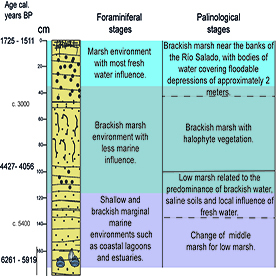
Archivos adicionales
Publicado
Número
Sección
Licencia
Derechos de autor 2024 Angélica Ballesteros-Prada, Isabel Vilanova, Mariel Luengo, Enrique Fucks, Emiliana Bernasconi

Esta obra está bajo una licencia internacional Creative Commons Atribución-SinDerivadas 4.0.

Los/las autores/as conservan los derechos de autor/a y garantizan a la revista el derecho de ser la primera publicación del trabajo licenciado bajo una licencia CC Attribution-NonCommercial 4.0 que permite a otros/as compartir el trabajo con el reconocimiento de la autoría y de la publicación inicial en esta revista.





